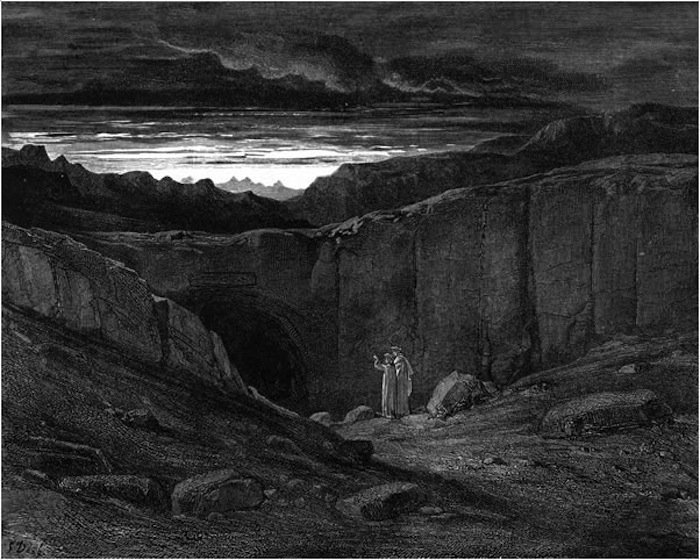The other day I wrote about having no hope.
More specifically no hope in this world, more specifically because the hopes we had have been hammered against hardened sand and dirt and clay, that is, against the rocks.
That may be the basic choice in life:
Heart hardened …
or
Hopes hammered …
And then there will still remain: God.
The one with whom we have to do. And if our hearts have been hardened we have no hope and if our hopes have been hammered we (of course) have no hope, but we have one thing, and oddly enough it turns out to be hope.
It turns out to be Him.
As with Dante, It’s Jesus all the way down.
*
I see now that I’m breaking my semi-vow not to write about this …
This morning, a Sabbath, I saw something.
Praying from the Baillie prayer book for today there were words reminding us of Jesus’ time on earth, and the things He said and did, and thus the example He left for us, as He said He would.
[That’s a lot of He and His and Him, and that’ll be proper pretty soon … ]
His obedience unto death
not incidentally leading to
His triumph over death
and
His sympathy with others’ suffering
not incidentally coupled with
His bravery in face of His own suffering
and
His complete reliance upon Thee, His Father in heaven
[And that’s a lot more about Him, all He did and said, and He made His … ]
*
There’s a hymn that goes
My hope is built on nothing less,
Than Jesus’ blood and righteousness.
I think less should be else.
And since salvation is for life not just for death, we mean all of life, not just death.
[Which He said we will never taste, anyway.]
If we hope in Christ only in this life, we are most to be pitied.
But what if we hope in Christ only in the next life, what then?
*
This matters.
We speak a fair amount of time of complete reliance and totally trusting Jesus for everything.
For everything mind you.
We also speak a good deal more of all the ways we don’t do that. We trust anything but Him.
Sometimes it’s what we do, sometimes it’s what someone else did, sometimes it’s our reasonable belief in certain things going certain ways, such that other things will go their ways, such that ultimately, finally — we will get our way.
We go to sleep expecting to wake up.
We get on the freeway to make it to work.
We do the work and say we must then get paid.
Sometimes it’s OK to talk this way: fine in one sense; not fine in another.
Some people, including we ourselves, hear only reasons. It’s right, to a point, to offer them.
But this leads usually to difficulty in going back to complete reliance and totally trusting. Or else they get shunted aside, into the corner, where we have, by all our other beliefs and actions (beliefs lead to actions), also place Jesus himself.
Go sit in the corner.
But it’s OK, right? That chair is sturdy and will hold his weight. It’s a good chair, made in … and bought from … and costing …
We end up with a life where we sit in chairs because they are fearfully and wonderfully made, even if it’s by a mass production shop in Burma for Walmart.
*
Wait a minute.
Are you saying you sit in a chair because God holds it in his hand?
Yes, that is what I’m saying.
*
Do we want a life where we trust we won’t die driving because of the skill and care of … other drivers?
*
We should hope, live, in nothing less, nothing else, than Jesus Christ.
He shatters our hopes, anyway I think He is shattering mine, to say so.
